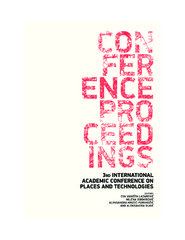Приказ основних података о документу
The routes of digitalization - from real to virtual city and vice versa
| dc.creator | Ralević, Miodrag | |
| dc.creator | Mrđenović, Tatjana | |
| dc.date.accessioned | 2020-03-12T10:59:19Z | |
| dc.date.available | 2020-03-12T10:59:19Z | |
| dc.date.issued | 2016 | |
| dc.identifier.isbn | 978-86-7924-161-0 | |
| dc.identifier.uri | https://raf.arh.bg.ac.rs/handle/123456789/501 | |
| dc.description.abstract | We live in informatics society in which we slowly, but certainly reach digitalization of real life in all of its aspects, starting from the user based dimension of functioning of all forms of communication between people through different networks: mobile phones, Facebook, social networks, etc.The spatial dimension (morphology) of entire Earth, regions, each ettlement, ets. can be observed through Google. Data based related to every living person is beeing formed, related to their stationary data, but also related to possibilities to “follow”, “tap/bug” and “track” every individual in space and time. Flows of financial capital are also being digitalized for every individual (using credit cards, on/line transactions, etc.) as well as in banking systems (on-line transactions). Everyday goods such as food, clothing, etc. can be ordered through portals on the internet. Even various study courses and schools are being organized via internet. The real world (space, people, money, knowledge) are digitally being moved into virtual space. Here question arises: In which space dimension is this process of digitalization is taking us? This main research question will lead the paper discussion opening basic dilemmas: (1) Will real life slowly move to virtual world? (2) Is the dematerialization of spatial and urban systems is at the end of the digitalization? (3) Shall and what kind of use we will have from virtual world in relation to possibilities of re/questioning developmental model options as well as in perceiving the effects of certain decisions/ trajectories in real life? The main goal of the paper is giving answers to above disposed questions as well as to the thesis that we have a great range of influence and possibilities on the new meaning of urban development (at all levels) that have to be transformed into digital sphere in order to be effectively and efficiently managed. | en |
| dc.language.iso | en | sr |
| dc.publisher | Belgrade : University of Belgrade - Faculty of Architecture | sr |
| dc.relation | info:eu-repo/grantAgreement/MESTD/Technological Development (TD or TR)/36035/RS// | |
| dc.rights | openAccess | sr |
| dc.source | Conference Proceedings [Elektronski izvor] / 3rd international Academic Conference on Places and Technologies, [14-15.04.2016, Belgrade] | sr |
| dc.subject | Urban development | sr |
| dc.subject | Digital city | sr |
| dc.subject | Dematerialization | sr |
| dc.subject | Management | sr |
| dc.title | The routes of digitalization - from real to virtual city and vice versa | en |
| dc.type | conferenceObject | sr |
| dc.rights.license | ARR | sr |
| dcterms.abstract | Мрђеновић, Татјана; Ралевић, Миодраг; | |
| dc.citation.spage | 587 | |
| dc.citation.epage | 595 | |
| dc.identifier.fulltext | https://raf.arh.bg.ac.rs/bitstream/id/1267/bitstream_1267.pdf | |
| dc.identifier.rcub | https://hdl.handle.net/21.15107/rcub_raf_501 | |
| dc.type.version | publishedVersion | sr |

